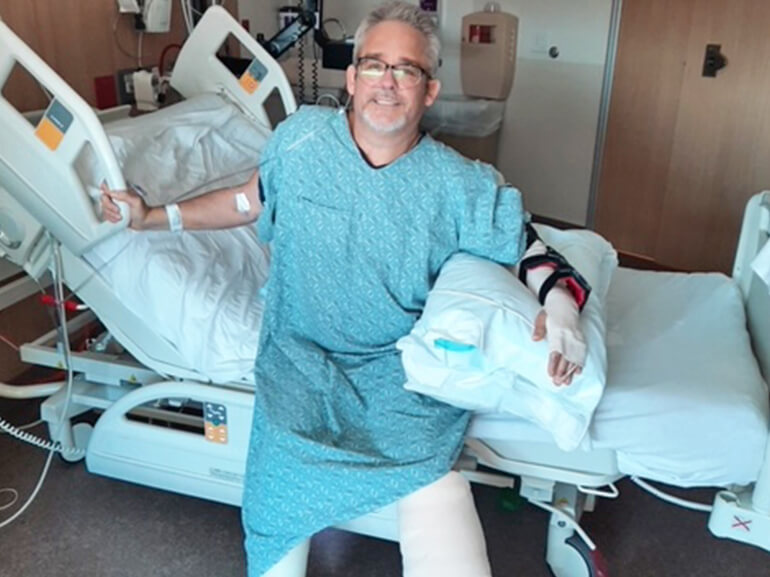Brian's story

A native of southern Illinois, Brian Knapp is a married 55-year old who designs structural components of houses for a living. He is also a retired musician who spent years playing bass guitar and singing in several bands. In addition to his wife and son, Brian is one of 11 siblings and loves spending time with his family.
On a snowy winter evening, Brian was driving home from work on a two-lane road when he was hit head-on by a car that swerved into his lane. He was taken by ambulance to the emergency room at SSM Health Saint Louis University Hospital. Brian suffered serious injuries in the accident, primarily to the lower left side of his body. In total, he required seven surgeries, including two on his right ankle and three on his left ankle, in addition to procedures on his left knee, left hip and left arm. “My surgeon was incredible,” Brian recalls. “He said that my surgeries were the most time he has ever spent on one patient.”
Brian was hospitalized for nearly a month before he was ready for the next phase of his recovery journey. Because Brian’s injuries were so severe, he and his family chose SSM Health Rehabilitation Hospital – Bridgeton. “I had heard the hospital had a great reputation,” Brian said, adding, “A lot of people recommended it.”
Upon arrival at SSM Health Rehabilitation Hospital– Bridgeton, Brian was unable to bear weight on either leg and had limited use of his left arm. He required total assistance to get in and out of bed and was unable to perform his personal care, including grooming and dressing. Brian was also struggling with significant pain from his injuries and subsequent surgeries. His physician-led team of nurses and physical and occupational therapists devised a plan to work with Brian’s unique challenges and get him on the road to recovery.
Brian’s goals at admission were simple, but not easy to accomplish given the severity of his injuries. “I wanted to be able sit up by myself,” he said. “I wanted to be able to do simple things, like getting my shirt and pants on by myself.”
Occupational therapy worked with Brian on modified techniques for dressing, bathing and other personal care tasks to improve his independence while making sure that he was not bearing weight on his legs or arm.
A major focus of his physical and occupational therapy sessions was teaching Brian to transfer from his bed to his wheelchair to the toilet using a transfer board that allowed him to slide easily.
Therapists also worked on improving range of motion to his left arm and strengthening his right arm, which was not injured, to help him more easily complete his transfers.
“From the very beginning, Brian and his family have been very motivated to make as much progress and learn as much as possible during this time,” one of his therapists said. “He sets goals for himself, is an active participant in each and every therapy session and does additional exercises on his own, which really helped him improve.”
A turning point in Brian’s recovery happened when he was finally able to sit at the edge of his bed. “It felt great to be vertical,” Brian recalled. He also credits his large family for keeping his spirits up by providing him with a lot of support and “sending lots of cards.”
When updating loved ones about Brian’s journey on social media, they used the hashtags #wegotthis, #forwardwego and #teambrian for inspiration. Brian’s family also participated in family training so they knew how best to assist him when he returned home.
During his 16-day stay at SSM Health Rehabilitation Hospital– Bridgeton, Brian made amazing progress. He went from requiring total assistance with his activities of daily living to needing only minimal assistance and supervision for transfers. Brian plans to continue his recovery with the help of home health services. He is looking forward to returning home and seeing his friends and family after being hospitalized for six weeks.
Brian has high praise for his care team, saying, “The rehab team has given me a lot of guidance and knowledge. They do a great job at listening and their attitudes are great. They surpassed my expectations.”
His therapists are equally complimentary of him. “Brian was very motivated and has such a positive outlook on his circumstances. He was fun and enjoyable to work with,” one therapist stated. Another therapist added, “He truly showed that keeping a great attitude during bad situations or hard times can truly make all the difference in recovery.”
When asked if he learned anything new about himself during his recovery, Brian says, “It is just as much mental as it is a physical battle. Keeping a positive attitude is the key.”